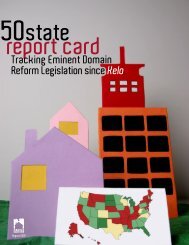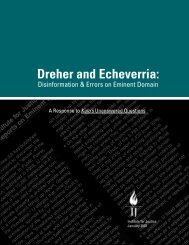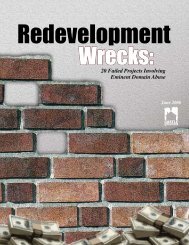Public Power, Private Gain - The Castle Coalition
Public Power, Private Gain - The Castle Coalition
Public Power, Private Gain - The Castle Coalition
Create successful ePaper yourself
Turn your PDF publications into a flip-book with our unique Google optimized e-Paper software.
A Few Examples of the Abuse ofEminent Domain for <strong>Private</strong> PartiesIn the past five years, governments have:•Evicted four elderly siblings in Bristol, Connecticut, from their home of the last 60 years for an industrial park;•Destroyed a black middle-class neighborhood in Atlantic City (including the home of a woman who lived on a streetnamed after her father) in order to build a tunnel to a casino;•Removed a woman in her 80s from her home of 55 years for the claimed purpose of expanding a sewer plant, butBremerton, Washington actually gave her former home to an auto dealership;•Condemned 10 homes for a shopping center and parking lot in Hurst, Texas and forced them to move while the spousesin two of the homes were dying of cancer;•Condemned a family’s home in Florida so that the manager of a planned new golf course could live in it;•Designated a neighborhood of colonial homes in Lakewood, Ohio blighted because their yards were too small and they lackedtwo-car attached garages. <strong>The</strong> City’s redevelopment plans call for upscale condominiums and retail;•Condemned small businesses for <strong>The</strong> New York Times and the New York Stock Exchange;•Threatened to condemn a Walgreens in Cincinnati to build a Nordstrom; condemned a CVS to relocate the Walgreens; andcondemned several small businesses to relocate the CVS. <strong>The</strong> Nordstrom was never built and became a parking lot;•Begun condemning a bus company in Edison Township, New Jersey, for a Walgreens. <strong>The</strong> Township’s consultant said thebus company was “unproductive and stagnant,” but actually it transports the local schoolchildren;•Planned to force the relocation of 500 low-income seniors in Aurora, Colorado, over the next 10 years;•Condemned property in Boston to help the owner get rid of its tenants and condemned property in Knoxville, Tennesseeto help the tenants get rid of their landlord;•Labeled as blighted one-tenth of the geographical area of San Jose, occupied by one-third of its citizens, making allhomes and businesses within the area susceptible to condemnation.<strong>The</strong> Tide is TurningEminent domain for private use happens all over the country, and local governments and developers regularly force residentsand businesses out by threatening eminent domain. But the news isn’t all bad. Courts, ordinary citizens, and even, occasionally,politicians are starting to say “enough is enough” and to prevent the use of eminent domain for private parties.Most private use condemnations never make it to court. For many years, courts simply rubber-stamped any use of eminentdomain. In recent years, however, courts have ruled against the government in a sizable minority of the cases where ownersdo challenge the condemnation. Courts rejected condemnations for private use or overturned blight designations (whichauthorize condemnations) permitting such condemnations a total of 37 out of 91 times (40 percent) between 1998 and 2002. 1Grassroots activism has defeated a number of projects, each of which would have forced the relocation of many homesand/or businesses. Voters rejected eminent domain projects three times at the polls and in at least 18 other instances,demonstrations and public pressure caused either the government or the developer to reject the use of eminent domain.State politicians proposed 17 bills to increase protections for people threatened by eminent domain. Although they managedto pass only six, the number proposed bodes well for the future. Local politicians even voted to limit their own eminentdomain power eight times.This report documents the widespread abuse of eminent domain, not for anything resembling a “public use,” but for privatebenefit and private profit. Eminent domain takes a terrible toll on its victims. It should be used only in the direst of publicnecessities and never for private ends.1 This number includes all judicial rejections of takings for private use, including those on statutory grounds. <strong>The</strong> trend toward greater judicialscrutiny of private takings means that courts are applying statutes more strictly than before. <strong>The</strong> total number includes only the mostrecent result of any given case, not separate numbers for the trial and appellate decisions. Decisions with mixed results were not included.3





